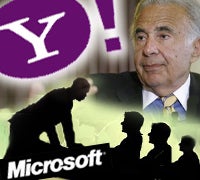 |
Carl Icahn turns up the heat on Yahoo. |
Two weeks after Microsoft abandoned its pursuit of Yahoo, a proxy fight launched by activist investor Carl Icahn has put Microsoft in the driver’s seat.
Icahn wants Yahoo (NASDAQ: YHOO) to reopen talks with Microsoft, saying the company’s board had acted “irrationally” when it rejected Microsoft’s $47.5 billion buyout offer. Microsoft (NASDAQ: MSFT) walked away from the deal earlier this month when Yahoo rejected its final offer of $33 a share, holding out for at least $37 a share.
“With Yahoo being pushed by shareholders to get back to the table, you would think it’s just what Microsoft wanted,” said Marc Weingarten, an attorney with Schulte Roth & Zabel.
For its part, Microsoft has declined to comment on Icahn’s actions. A company spokesman repeated the same message that its executives have said over the last two weeks: It had moved on.
Still, Icahn has opened the door for Microsoft to swoop in and buy Yahoo in a friendly deal without instigating the proxy battle it had threatened.
“Microsoft can come directly back to the Yahoo board and save them from the proxy contest, save them from all the criticism that they are getting,” said Weingarten.
Redmond’s motivation for buying Yahoo — to create an online advertising powerhouse to rival Google (NASDAQ: GOOG) — remains intact. The alternatives of a build-from-within strategy and a piece-by-piece acquisition strategy could bring significant risk.
Should Microsoft wait?
Mergers and acquisitions experts said it would be wise for Microsoft to lie low and see if pressure from Icahn and other activist investors will prompt Yahoo’s board to turn to Microsoft with hat in hand.
“The whole strategy for Microsoft, in an M&A sense, was to say ‘fine, we take our bat and ball and go home.’ You don’t want to say that and then be seen popping out of the house and looking down the block for your former playmates,” said Marshall Sonenshine, chairman of New York-based investment bank Sonenshine Partners.
“If they have any intention of coming back, they shouldn’t say anything. If they don’t have any intention, then they have nothing to say,” said Sonenshine, who sees the deal getting done at a price slightly above $33 a share.
Sonenshine said an eventual Microsoft-Yahoo deal may play out like News Corp.’s acquisition of Dow Jones.
The Bancroft family, which controlled Dow Jones, balked at News Corp.’s (NYSE: NWS) $5.6 billion bid, but the 65 percent premium proved too attractive for many family members to resist, especially after it eliminated the possibility of competing bids.
Similarly, shareholders may push Yahoo to accept Microsoft’s $33-a-share bid, a 72 percent premium on Yahoo’s share price before Microsoft went public with its hostile bid on February 1, especially if no other viable offers emerge.
Shares of Yahoo fell below $23 after Microsoft pulled its offer. Yahoo’s two largest shareholders, Capital Research Management and Legg Mason, have signaled displeasure with how the company handled negotiations with Microsoft.
In a response to Icahn, Roy Bostock, Yahoo’s chairman, defended the board’s actions and said it continues to “actively and expeditiously explore strategic alternatives.”
“What’s unusual about this is that the Yahoo board said, ‘No, this is not good enough, and we’re just going to go back to being a company.’ The stock collapsed, and that honked off a lot of shareholders,” said Bob Profusek, head of the mergers and acquisitions practice at law firm Jones Day.
“Everybody is fixated on the Microsoft bid, but causing something else to happen that would create short-term shareholder value could also be a payday for (Icahn).”
Historically, companies targeted in a hostile takeover bid would issue a special dividend, a major share buyback or another measure to ease the blow from a fall in the share price if a deal collapsed, according to Profusek.


